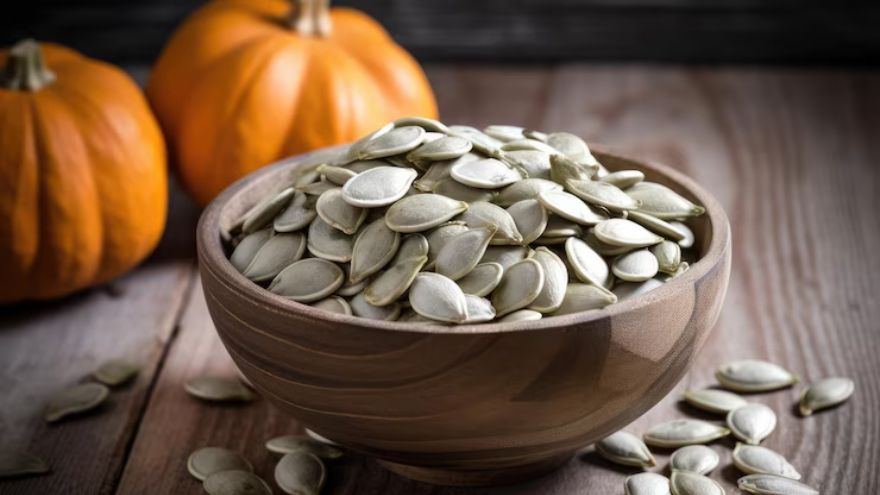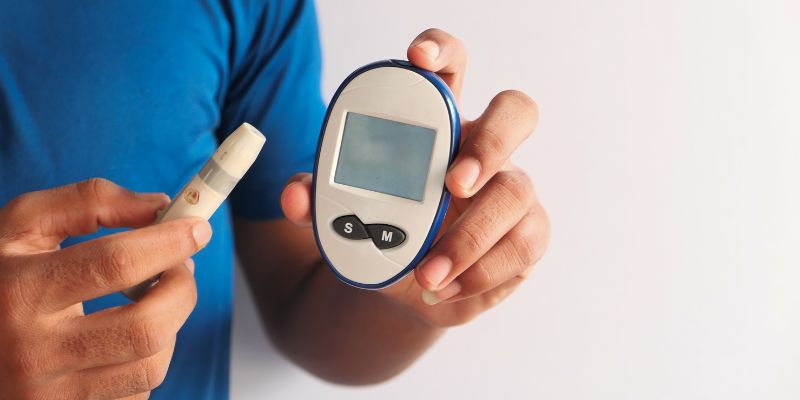
Pumpkin seeds, often overlooked and discarded with the pumpkin flesh, are nutritional powerhouses packed with various health benefits. These small, green seeds, also known as pepitas, are rich in essential nutrients and compounds that promote overall well-being. Whether consumed raw, roasted, or mixed into various dishes, pumpkin seeds can be a valuable addition to a healthy diet. In this blog, we'll explore the numerous health benefits of pumpkin seeds, backed by scientific evidence.
Nutrient-Rich Profile
Pumpkin seeds boast an impressive nutrient profile. They are a rich source of protein, healthy fats, vitamins, and minerals. A one-ounce (28-gram) serving of pumpkin seeds contains approximately:
- Calories: 151
- Protein: 7 grams
- Fat: 13 grams (including 6 grams of omega-6 fatty acids)
- Carbs: 5 grams
- Fiber: 2 grams
- Magnesium: 37% of the Daily Value (DV)
- Zinc: 14% of the DV
- Iron: 23% of the DV
- Copper: 19% of the DV
- Manganese: 42% of the DV
Additionally, pumpkin seeds contain antioxidants like carotenoids and vitamin E, which help combat oxidative stress and inflammation in the body.
Heart Health
Pumpkin seeds are excellent for heart health due to their high content of magnesium, zinc, and omega-3 and omega-6 fatty acids. Magnesium helps regulate blood pressure, maintain healthy blood vessels, and prevent sudden cardiac arrest, heart attack, and stroke. Studies have shown that adequate magnesium intake is associated with a lower risk of heart disease.
The presence of omega-3 and omega-6 fatty acids in pumpkin seeds contributes to cardiovascular health by reducing cholesterol levels and inflammation. These fatty acids help in maintaining the elasticity of blood vessels and preventing plaque buildup in the arteries, thus reducing the risk of atherosclerosis and heart disease.
Prostate Health
Pumpkin seeds have been traditionally used to support prostate health, especially in men. They contain high levels of zinc, which is crucial for prostate function. Studies have suggested that zinc may play a role in reducing the risk of prostate enlargement (benign prostatic hyperplasia or BPH) and prostate cancer.
Phytosterols found in pumpkin seeds also contribute to prostate health by inhibiting the growth of prostate cells. Additionally, the anti-inflammatory properties of pumpkin seeds can help alleviate symptoms associated with BPH, such as urinary difficulties and increased urinary frequency.
Improved Sleep Quality
Pumpkin seeds are a natural source of tryptophan, an amino acid that is a precursor to serotonin and melatonin. Serotonin is a neurotransmitter that contributes to feelings of well-being and happiness, while melatonin is a hormone that regulates sleep-wake cycles.
Consuming pumpkin seeds can help improve sleep quality by increasing the production of serotonin and melatonin. Magnesium in pumpkin seeds also plays a role in promoting relaxation and improving sleep quality. A handful of pumpkin seeds as an evening snack can contribute to a restful night's sleep.
Blood Sugar Regulation
Managing blood sugar levels is crucial for individuals with diabetes or those at risk of developing the condition. Pumpkin seeds have been shown to help regulate blood sugar levels due to their low glycemic index and high fiber content. The fiber in pumpkin seeds slows down the absorption of sugar into the bloodstream, preventing spikes in blood sugar levels.
Moreover, the presence of magnesium in pumpkin seeds is beneficial for insulin sensitivity. Studies have found that magnesium helps improve insulin sensitivity, which is essential for maintaining stable blood sugar levels and reducing the risk of type 2 diabetes.
Anti-Inflammatory Properties
Chronic inflammation is a common underlying factor in many diseases, including heart disease, cancer, and arthritis. Pumpkin seeds contain antioxidants like carotenoids and vitamin E, which help reduce inflammation by neutralizing free radicals in the body.
Furthermore, the omega-3 fatty acids in pumpkin seeds have anti-inflammatory effects. These fatty acids inhibit the production of inflammatory molecules, thus helping to reduce inflammation and associated symptoms in conditions such as arthritis.
Bone Health
Pumpkin seeds are a rich source of magnesium, phosphorus, and zinc, all of which are essential for maintaining healthy bones. Magnesium plays a critical role in bone formation and mineralization. It helps regulate calcium levels in the body, which is vital for bone health.
Phosphorus is another important mineral found in pumpkin seeds that contributes to bone strength and structure. Zinc is necessary for bone tissue renewal and repair. Consuming pumpkin seeds can help prevent osteoporosis and maintain bone density as you age.
Boosted Immune System
A robust immune system is essential for protecting the body against infections and diseases. Pumpkin seeds are rich in zinc, a mineral known for its immune-boosting properties. Zinc helps in the development and function of immune cells, enhancing the body's ability to fight off infections.
Additionally, the antioxidants in pumpkin seeds help protect immune cells from damage caused by free radicals. The anti-inflammatory properties of these seeds also contribute to a well-functioning immune system by reducing chronic inflammation that can weaken immune response.
Enhanced Digestion
Dietary fiber is essential for healthy digestion, and pumpkin seeds are a good source of both soluble and insoluble fiber. Soluble fiber absorbs water and forms a gel-like substance in the digestive tract, which helps slow down digestion and absorption of nutrients. Insoluble fiber adds bulk to stool and promotes regular bowel movements, preventing constipation.
Consuming pumpkin seeds can support digestive health by promoting a healthy gut microbiome. The fiber in pumpkin seeds acts as a prebiotic, providing nourishment for beneficial gut bacteria. A healthy gut microbiome is linked to improved digestion, better nutrient absorption, and a stronger immune system.
Weight Management
Adding pumpkin seeds into your diet can aid in weight management. Despite being calorie-dense, pumpkin seeds are rich in protein and fiber, both of which promote satiety and reduce overall calorie intake. Protein is known to increase feelings of fullness and reduce appetite, while fiber slows down digestion and keeps you feeling full for longer.
Moreover, the healthy fats in pumpkin seeds provide sustained energy, helping you avoid energy crashes and subsequent cravings for unhealthy snacks. Including pumpkin seeds as part of a balanced diet can help you maintain a healthy weight.
Skin and Hair Health
Pumpkin seeds are beneficial for skin and hair health due to their high content of essential fatty acids, antioxidants, and vitamins. The zinc in pumpkin seeds plays a role in collagen synthesis, which is vital for maintaining skin elasticity and preventing wrinkles. Zinc also helps in wound healing and reducing acne by regulating sebum production.
Vitamin E, an antioxidant in pumpkin seeds, helps protect the skin from damage caused by UV rays and environmental pollutants. The healthy fats in pumpkin seeds nourish the skin, keeping it hydrated and smooth.
For hair health, the presence of iron in pumpkin seeds is crucial. Iron deficiency can lead to hair loss, and consuming iron-rich foods like pumpkin seeds can help prevent this. The essential fatty acids in pumpkin seeds also promote healthy hair growth by nourishing hair follicles and improving scalp health.
Versatile and Delicious
One of the best things about pumpkin seeds is their versatility in the kitchen. They can be consumed raw, roasted, or sprouted. You can add them to salads, smoothies, yogurt, or oatmeal for a nutritional boost. Pumpkin seed butter is another delicious option, similar to peanut or almond butter.
Roasting pumpkin seeds with a sprinkle of sea salt or your favorite spices makes for a tasty and healthy snack. They can also be ground into a powder and added to baking recipes or used as a topping for soups and stews.
Conclusion
Pumpkin seeds are a nutrient-dense superfood with a myriad of health benefits. From supporting heart health and prostate health to improving sleep quality and digestion, these tiny seeds pack a powerful punch. Their rich nutrient profile, including magnesium, zinc, and essential fatty acids, makes them a valuable addition to any diet.
Incorporating pumpkin seeds into your daily routine can be as simple as adding them to your favorite dishes or enjoying them as a snack. By doing so, you'll be reaping the numerous health benefits they offer, contributing to your overall well-being. So next time you carve a pumpkin or find pumpkin seeds at the store, don't overlook these little nutritional gems. Embrace the health benefits of pumpkin seeds and enjoy the positive impact they can have on your life.
People's Queries Regarding Pumpkin Seeds
1. Are pumpkin seeds safe for everyone to eat?
Ans. Most people can safely eat pumpkin seeds, but those with seed allergies should avoid them. It's also wise to consume them in moderation due to their high calorie content.
2. How should pumpkin seeds be stored to maintain freshness?
Ans. Store pumpkin seeds in an airtight container in a cool, dark place. For longer shelf life, keep them in the refrigerator or freezer.
3. Can I eat pumpkin seeds raw, or should they be roasted?
Ans. Pumpkin seeds can be eaten raw or roasted. Roasting enhances their flavor but raw seeds retain more nutrients. Choose based on your preference and dietary goals.
4. Are there any side effects of eating too many pumpkin seeds?
Ans. Eating too many pumpkin seeds can lead to digestive issues like bloating and gas due to their high fiber content. Moderation is key.
5. Do pumpkin seeds contain gluten?
Ans. Pumpkin seeds are naturally gluten-free, making them a great snack for those with gluten sensitivity or celiac disease.
6. Can pumpkin seeds help with weight loss?
Ans. Yes, pumpkin seeds can aid in weight loss. They are high in protein and fiber, which help promote satiety and reduce overall calorie intake.
7. How do pumpkin seeds benefit athletes?
Ans. Pumpkin seeds provide protein, healthy fats, and magnesium, which are essential for muscle repair, energy production, and preventing cramps. They make an excellent post-workout snack.
8. Are pumpkin seeds good for children's health?
Ans. Pumpkin seeds are nutritious and can be included in a child's diet for added vitamins, minerals, and healthy fats. However, ensure they are age-appropriate and watch for potential choking hazards in young children.
9. Can pumpkin seeds be included in a vegan or vegetarian diet?
Ans. Absolutely. Pumpkin seeds are a great source of plant-based protein, healthy fats, and essential nutrients, making them ideal for vegan and vegetarian diets.
10. What are the benefits of pumpkin seed oil compared to whole seeds?
Ans. Pumpkin seed oil is rich in healthy fats and antioxidants. It can support heart and prostate health, and is often used topically for skin and hair benefits. However, it lacks the fiber found in whole seeds.



